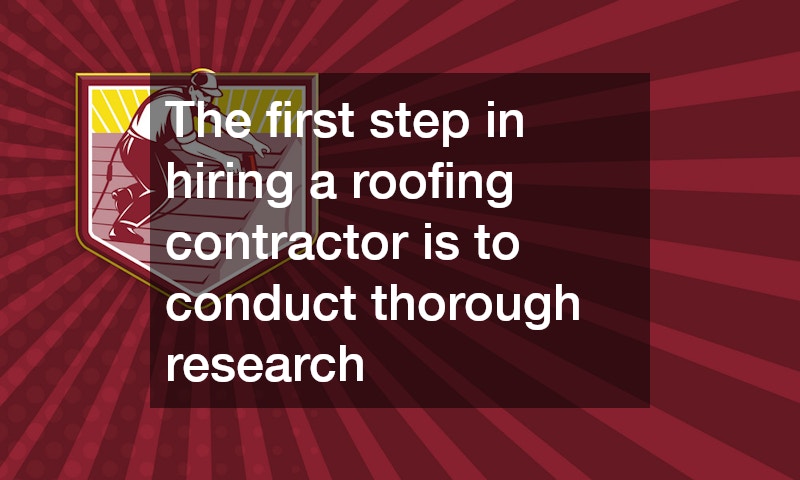Hiring a roofing contractor is a significant decision that impacts the safety and longevity of your home. It’s essential to approach this task with due diligence, especially when considering residential roofers. A clear understanding of what to look for in a roofing contractor can save you time, money, and frustration.
Below are some critical steps to take before making this crucial decision.
Research and Gather Recommendations
The first step in hiring a roofing contractor is to conduct thorough research. Start by gathering recommendations from friends, family, or neighbors who have had positive experiences with residential roofers. Word-of-mouth referrals can be incredibly reliable as they come from people you trust. However, don’t stop at personal recommendations; extend your search online. Websites like Angie’s List and Yelp can provide valuable insights into a contractor’s reputation and customer satisfaction levels.
In addition to recommendations, make sure to take advantage of social media platforms. Today, many local businesses, including roofing contractors, maintain active profiles on sites like Facebook and Instagram. These platforms can serve as an excellent resource for reviews and ratings. Often, you can find before-and-after pictures of previous projects they’ve completed. This visual proof can reinforce the credibility of the contractor and help build your confidence in their abilities.
Lastly, consider contacting your local better business bureau for any unresolved complaints lodged against any potential contractors. This step is essential because it offers a backup verification of a contractor’s trustworthiness. A contractor with unresolved complaints or a poor business bureau rating might not be the best option. Remember, the goal is to find a well-reputed contractor who has consistently met customer expectations. This ensures that you will likely receive quality service and avoid major headaches down the line.
Verify Licensing and Insurance
Before hiring any residential roofers, it’s crucial to verify their licensing and insurance. A valid license demonstrates that the contractor has met the necessary qualifications and is authorized to operate in your area. Licensing requirements can vary from state to state, so ensure you’re familiar with regulations specific to your location. Contractors should have no issue providing proof of licensing. Their willingness to present this information openly speaks volumes about their professionalism and transparency.
Equally important is ensuring the contractor carries adequate insurance. This includes both liability insurance and worker’s compensation. Liability insurance protects your property from damage caused during the roofing process, whereas worker’s compensation covers the medical expenses and lost wages for any worker injured on your property. Failure to secure proof of insurance could result in significant financial liability if an accident were to occur. Missteps here could leave you responsible for any associated costs or damages.
To further protect yourself, you may also want to contact the insurance carrier directly to confirm the roofing contractor’s policy is active and up-to-date. This extra step ensures that there’s little room for error or deceit. Some unscrupulous contractors may attempt to cut corners with expired or inadequate insurance. Verifying this information allows you to vet out inadequate service providers. Always take the steps to confirm that your roofer operates entirely above board for peace of mind during your project.
Request Detailed Estimates
Once you’ve narrowed down a list of potential residential roofers, it’s time to request detailed estimates. A comprehensive estimate should provide a clear picture of the costs associated with your roofing project. It should break down expenses, including materials, labor, and any additional charges, such as waste disposal fees. Without a clear, detailed estimate, you may find yourself facing unexpected costs later on. A reliable contractor should be more than willing to outline each aspect of the job in detail.
Compare estimates from multiple contractors to determine which offers the best value. Keep in mind that the cheapest option isn’t always the best option. Low prices may indicate subpar materials or lack of experience. Quality workmanship should be prioritized over cost, as poor roofing work can lead to more significant expenses in the future. When reviewing estimates, also consider the projected timeline for the project and make sure it aligns with your needs.
Don’t hesitate to ask questions if anything in the estimate is unclear or concerning. Communication is a cornerstone of any successful business relationship. Your contractor should be open and transparent, willing to discuss every part of the estimate with you. Asking questions not only clarifies any uncertainties but also gives you further insight into the contractor’s attitude and professionalism. Clear, upfront communication lays the groundwork for a smooth, successful roofing project.
Check References and Previous Work
The next step before finalizing any agreement with a roofing contractor is to check their references. Ask potential contractors to provide a list of past clients and follow up by contacting these individuals. Inquire about their experience with the contractor, the quality of workmanship, and their overall satisfaction. This firsthand feedback can give you a well-rounded view of what working with that contractor might look like. It’s one of the most reliable ways to ensure you are choosing someone who consistently delivers excellent results.
While speaking with references is crucial, independently verifying past work is equally important. Visit, if possible, some of the previous job sites or look at before-and-after photo showcases the contractor might have on their website. Seeing their previous projects firsthand can solidify your trust in their abilities. You gain an understanding of the scope and scale of their work, as well as the materials they commonly use. This step can also reveal their attention to detail and overall craftsmanship quality.
Lastly, use this opportunity to assess the contractor’s affiliations and certifications from roofing product manufacturers or industry bodies. These can add an extra layer of assurance about their expertise and commitment to ongoing professional development. Contractors committed to maintaining certifications are usually more knowledgeable about the latest roofing technologies and best practices. Such credentials can be especially important if you have specific roofing requirements or are considering high-end materials. They often signify a roofer that’s not only vetted by their clients but also by their peers and industry leaders.
Understand the Contract Terms Fully
The final step before hiring a roofing contractor is understanding the contract terms completely. Review the contract carefully to ensure all aspects of the project are clearly defined and agreed upon. Important elements include the project timeline, payment schedule, materials specifications, and warranties. Do not hesitate to ask for clarification or amendments if any part of the contract is unclear or seems unfavorable. Understanding the contract helps prevent misunderstandings and protects both you and the contractor.
A key component often overlooked is the warranty information. Ensure that the contract includes details about both the manufacturer’s warranty for materials and the contractor’s warranty for workmanship. These warranties provide you with protection and peace of mind, knowing you won’t be out-of-pocket for defects or poor workmanship. It is crucial to fully understand the duration and specific terms of these warranties. This knowledge can save you time and trouble should issues arise later on.
Remember that a reputable contractor will prioritize transparent and detailed contract terms. They will be open to discussing the terms fully and making necessary adjustments if needed. A contractor’s willingness to negotiate showcases their commitment to client satisfaction and ethical business practices. Look for those who are open and willing to spend time to ensure you comprehend every part of the agreement. This approach sets the stage for a successful relationship and project execution.




